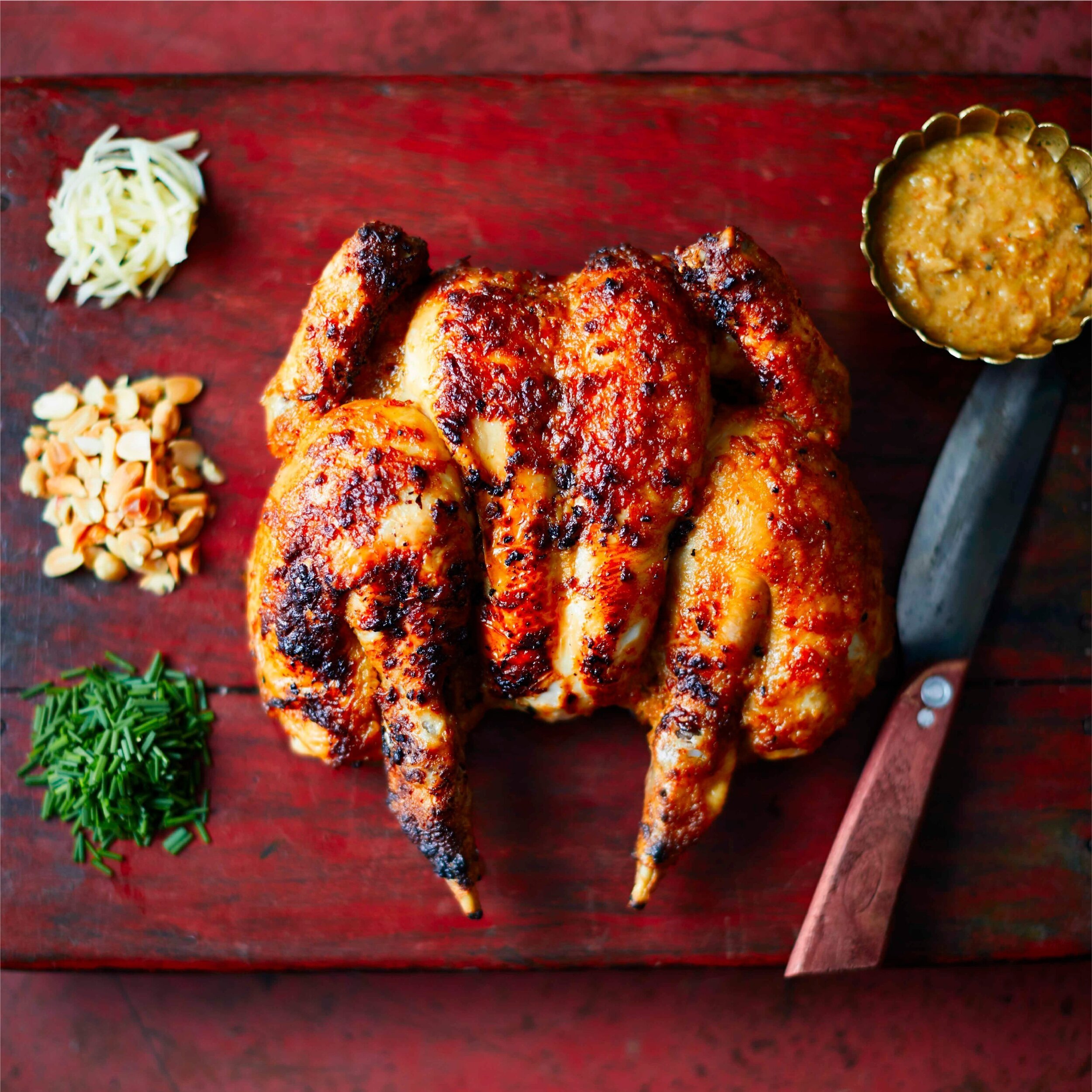Southern Style Marinated Whole Chicken Satay

This recipe also appeared in The Independent.
This recipe also appeared in The Evening Standard.
Satay is commonly eaten across Asia and traditionally is used to marinate meats or vegetables before skewering and barbecuing over open flame. It seems every recipe involving making a curry paste from scratch takes me a while to even write, so you can guess that it also takes a little while to prepare and cook. However, if you make this satay chicken you will never order satay chicken in a dodgy Thai joint ever again as you might as well stay at home and make it better yourself. If your lucky enough to have some sun shine then scrap roasting this in the oven. Spatchcock the bird, marinade and stick it on the BBQ until cooked throughout.
Feeds 4, gluten free
Ingredients
1 whole large chicken, around 1.5kg, corn fed and free-range
8 large dried red chilies, chopped in half with scissors, soaked in warm water to soften, drained, de-seeded
6 banana shallots, peeled
5 garlic cloves, peeled
1 large knob, roughly 40g, peeled ginger
80g desiccated coconut
80g roasted peanuts
500ml coconut cream
2 tablespoon fish sauce
2 tablespoons palm sugar
large pinch of coarse salt
6 tablespoons vegetable oil
Method
Firstly, make the paste. In a large pestle and mortar proceed to pound all ingredients one at a time first. Individually pound each ingredient until the mixture begins to resemble a paste, then remove from the pestle and place to one side. Start with the dried chili, ginger, garlic, shallots, peanuts and then coconut, using salt as an abrasive if needed. Once all ingredients have had a good bashing, then continue to add all the ingredients together in the pestle and mortar until they have all become one paste, it is normal for this process to take quite a time to complete properly. Because of the coconut content this paste will only last a week or so, so keep the container it is in wrapped airtight and refrigerated or freeze.
Now cook out the satay curry. In a large non-stick pan add the vegetable oil and heat to a high heat. Add the paste and continue to cook out using a metal spoon so you can scrape the paste as it will want to stick to the pan, continue to fry the paste for around 15-20 minutes until the paste darkens slightly and the smell becomes one. I always find when cooking out a curry that you can smell the individual ingredients cooking in turn, until it all blends into one smell once all ingredients are cooked and fused together. At this stage add the palm sugar and turn the paste down to a medium heat, continue to stir and scrape until the sugar caramelises and the paste begins to darken. When this happens add the fish sauce, adding this moisture to the paste will deglaze any paste that has stuck a little to the pan. Next take off the heat and add the coconut cream and mix well.
Allow this mix to cool and then place the chicken in a tray and cover with the cooked-out curry paste, making sure to completely cover the whole chicken under and over with the paste. Then leave this to marinate for a minimum of 2 hours, ideally overnight.
Once marinated pre-heat an oven to 200 degrees centigrade and place the chicken, skin side up, in a non-stick tray, covered with tin foil on the middle shelf for 40-45 minutes, removing the tin foil for the final 10 minutes of cooking to colour the skin. The paste on the top should be beginning to crisp a little and the chicken juices should be running into the curry paste. Check that the chicken is cooked throughout by making an incision at the leg all the way down to the bone and checking if there are any signs of blood, if there is return to the oven for a further 5-10 minutes until it is cooked. For best results use a temperature probe, you can take it out at 75 degrees centigrade and it will still be moist and succulent. Allow to rest for 5 minutes before serving.
Serve with steamed jasmine rice and carve at the centre of the table.
Head chef & founder of Farang London restaurant. Cookbook author of ‘Cook Thai’ & ‘Thai in 7’. Chief curry paste basher and co-founder of Payst London.
